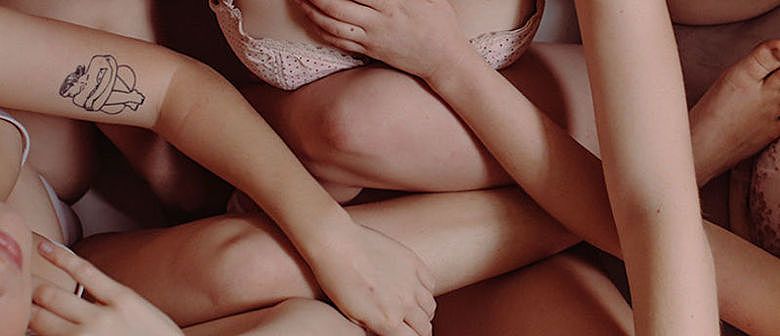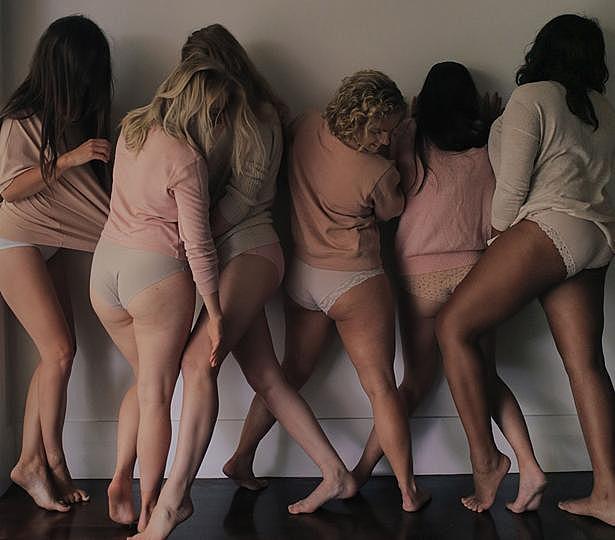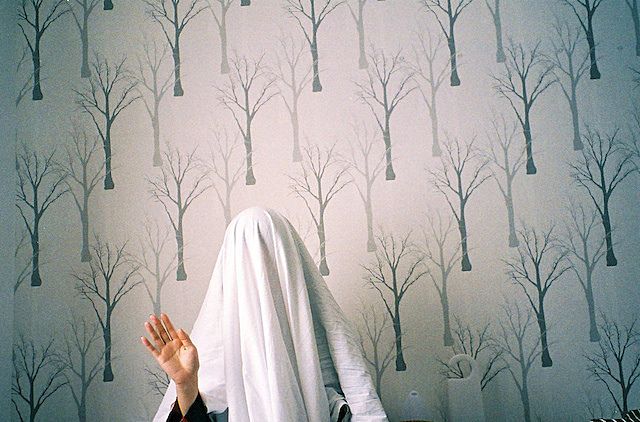A Marketable Femininity: A Review of FLAPS: Retouched
FLAPS: Retouched sells itself as a visceral, honest and celebratory exploration of 'all things VAGINA'. Jess Bates reviews and finds a show that does more to enforce the known than disrupt the stereotypes.
FLAPS: Retouched sells itself as a visceral, honest and celebratory exploration of 'all things VAGINA'. Jess Bates reviews and finds a show that does more to enforce the known than disrupt the stereotypes.
In the week I go to see FLAPS: Retouched, I also discover Pussy Riot’s Straight Outta Vagina in an online trawl. It can’t be a coincidence. Like their Russian counterparts, the Bits and Pieces ensemble want to scream and be heard, and this second iteration of their sassy devised show, currently dominating the Basement Theatre, has all the shock rhetoric of a fearless new frontier of female-driven work. FLAPS is essentially a skit show - a form driven by visual gags and dramatized jokes to accommodate an investigation into the visceral matter of being born with a vagina. In the exhilarating swoop of feminist theatre to hit the Basement this year (see ReVOLT, 21 Movements, Castles, Power Ballad), FLAPS is not the first show to take the female body as its point of departure, but it is most definitely the most bald about its subject matter. The title gives room for a powerful reclaiming and a sense of slapstick - all delightful promises for the show ahead.
As I walk into the theatre, I feel unmistakably like an uninitiated member of a sorority - I grew up reading Sweet Valley High, and there is undoubtable resonance here. The cast are playing host, they offer marshmallows, they take coats, bags and shoes. The space is an invitation - many in the audience are bedding down on mattresses, eating marshmallows proffered by roaming cast and tapping their toes to Cyndi Lauper’s 'Girls Just Want To Have Fun'. There is a choice here to be unashamedly occupying a marketable femininity.
With a palette as pale as a vintage instagram filter, the cast are swathed in creamy beiges and muted pinks. The room is a re-imagined stereotype of feminine space, a soft boudoir of bedsheets and suspended lingerie. There is something charmingly dated about these tropes - the room is equally a femme fortress and a girly sleepover, and as the lights go down to six-year-old Beyonce hit 'Run The World (Girls)' - it is clear that these well-worn cultural objects are the source of empowerment on which this seven-strong cast will draw.
FLAPS calls to an opening up of these terms, but in doing so, happily rides on the existing discomfort of the audience, without necessarily providing a different pathway of understanding.
The sketches are principally concerned with menstruation (and its products), sexually transmitted infections, clitoral navigation and bodily discharge from a number of orifi. I know as I write that description that I am using scientised euphemisms for the female experience, and I do so to indicate the curious politics of language that we encounter here. What my mother encouraged us to call our “front bottom,” my sister is now demystifying to my niece as a “vulva,” partly in order for her to approach the word with confidence and also to avoid the kind of bashful (and damaging) hand-to-mouth giggles that dislocate women from their bodies and make it impossible to find their genitalia as more than the butt of an evolutionary joke. FLAPS calls to an opening up of these terms, but in doing so, happily rides on the existing discomfort of the audience, without necessarily providing a different pathway of understanding.
A case in point is an early sketch that delightfully personifies the spectrum of underwear, and the whole crowd erupts at the bawling bloody-headed “period undies” bemoaning their messy job ahead. This is a successful sketch, and the character work of the actresses is among the best work of the night, but I can’t help wondering how else bloodied underwear could be framed, and if it necessarily useful to simply maintain it as an object of shame. If isolated, this kind of comic release could be understood, but the reinscribing of women’s bodies as a source of disgust is central to the thread of punchlines throughout the night. In an offstage narrated sketch, one woman is implored to pop another’s pimple, to which the outraged punchline is “fuck no!” In another, a girl confesses after her ‘first time’ that she bled on the sheets. The sheet she refers to is not only stained with an extreme quantity of blood, but it is also wrapped around her, which she then enlists the help of two audience members to hide. Too often the gags suffer from this obtuse collision of both showing and telling at the same time, where an indirect pairing of form and image might serve them better. The intention to truth-bomb the audience with female viscerality, however, remains clear. Much of this material is played with a bold, shameless quality, but the action on the stage cannot be ignored - we are invited, yet again, to laugh at the revolting excesses of the female form.
There are, however, some highly watchable moments, and the show does its best work when it stays one step ahead of the audience. Frith Horan in particular is a grounded force on the stage, enthusiastically pitching our own vaginal malaise back to us as a range of products, helpfully assuring us that even if we are not in the market for bacterial vaginosis, thrush or a urinary tract infection, we’ll probably still get one on the house. At its fullest extension, this moment might be an opening for an entire trajectory of theatre-making, in a re-imagining of our sexual health education in schools. It’s a hopeful thought. As well, the cast have some capable singers among them, and their talent is appreciated. My personal favourite is a roaring duet about tampon insertion with the beautiful chorus line “wrong angle.” This is a pitch-perfect sketch for the ensemble, where performance skill meet minimal text to efficiently celebrate a universal female experience. Not every sketch, however, carries this light touch.
A key challenge of working in this space remains representing women on the stage in a complex way. It is clear this cast is grappling with the internalised patriarchy that women re-impose on themselves in the form of standards for beauty or hygiene - which is a necessary dialogue to explore, comedically or otherwise. But the difficulty is that holding an authentic female experience alongside the contradiction of adhering to a flawed system of self-worth is a hard thing to do, when all of our comic tropes around women fail this test so readily.
The cultural soup that practitioners often draw on to make devised work is riddled with cliches, and in doing so, the source of entertainment can so quickly ally itself with the root of misogyny. In a waxing gag, involving a duct taped cast member and a bubbling voice-over, our enthusiastic beautician speaks in the high-pitched twitter that has come to stand in for the “dumb girls” trope. Later, an entertaining Catherine-Tate style office sketch employs bodacious caricatures, but it is ultimately a scene of two women arguing over menial tasks and the attention they garner from their male boss. It is both a petty display and a funny one, by virtue of the unmitigated commitment and comic timing from both actors, but the fundamental matter of the scene, in the context of the remaining content of the show, would benefit from a closer look.
The ensemble is strongest when they surprise us, embracing their low-fi aesthetic and not pretending to be more than the sum of their parts.
The ensemble is strongest when they surprise us, embracing their low-fi aesthetic and not pretending to be more than the sum of their parts. Renovating Gwen Stefani’s hit to their unaccompanied and rib-popping chant “this shit is VAGINAS,” and the playing of a raw interview with one of their mothers about giving birth are both satisfying inclusions. There is a giggling electricity to the game “never-have-I-ever,” played in pitch black, lighting the faces of those who wish to confess to (variously) shagging in a car, tasting their own vagina or wishing another person fatter. This is both simple and interesting, and the ensemble doesn’t have to work hard to communicate a lot. The confessional form returns throughout the piece, forming a spine through the disparate material of the sketches, and while I am pleased to meet it each time, I wonder how it might grow - pushing torches into the hands of the audience to participate for example, or landing on some real, difficult confessions rather than flickering “how embarrassments.”
When we get glimpses of earnest experience, such as Brie Hill’s spoken word lament for her maligned heart, it is often unable to be held alongside the landslide of comedy that preceded it. In general, the work suffers from a lack of tonal curation, struggling to hold hard truths with the gravity they deserve, and quickly deflating these moments with sketches that don’t always serve the work’s intention. A kind of mono-vocalism emerges, where there is repetition of similar ideas and far too much material is presented for this ninety minute work to pack the punch that it might.
The performers work hard for this material, pushing valiantly into a comedic space for and about women that is difficult to navigate without reiterating the status quo. And in challenging it’s execution of empowerment, I cannot speak to the personal outcomes of making this work for the cast within it. However I do know that our culture holds a fat and unfunny silence: the absent history of female voices, and this is what makes this task so hard in the first place. It is also what makes the gesture of new work, such as this, so appealing. In order to acknowledge this problem, simply putting seven female bodies on stages is not enough: we must all charge each other with a more difficult task. To the emerging and hopeful practitioners of FLAPS, I would encourage their work to push further into disrupting, rather than reinforcing, the inequitable stereotypes inside which we live.
FLAPS: Retouched runs at
The Basement
from Tuesday 28 March to Saturday 8 April
For tickets to and more information about FLAPS: Retouched, go here.


